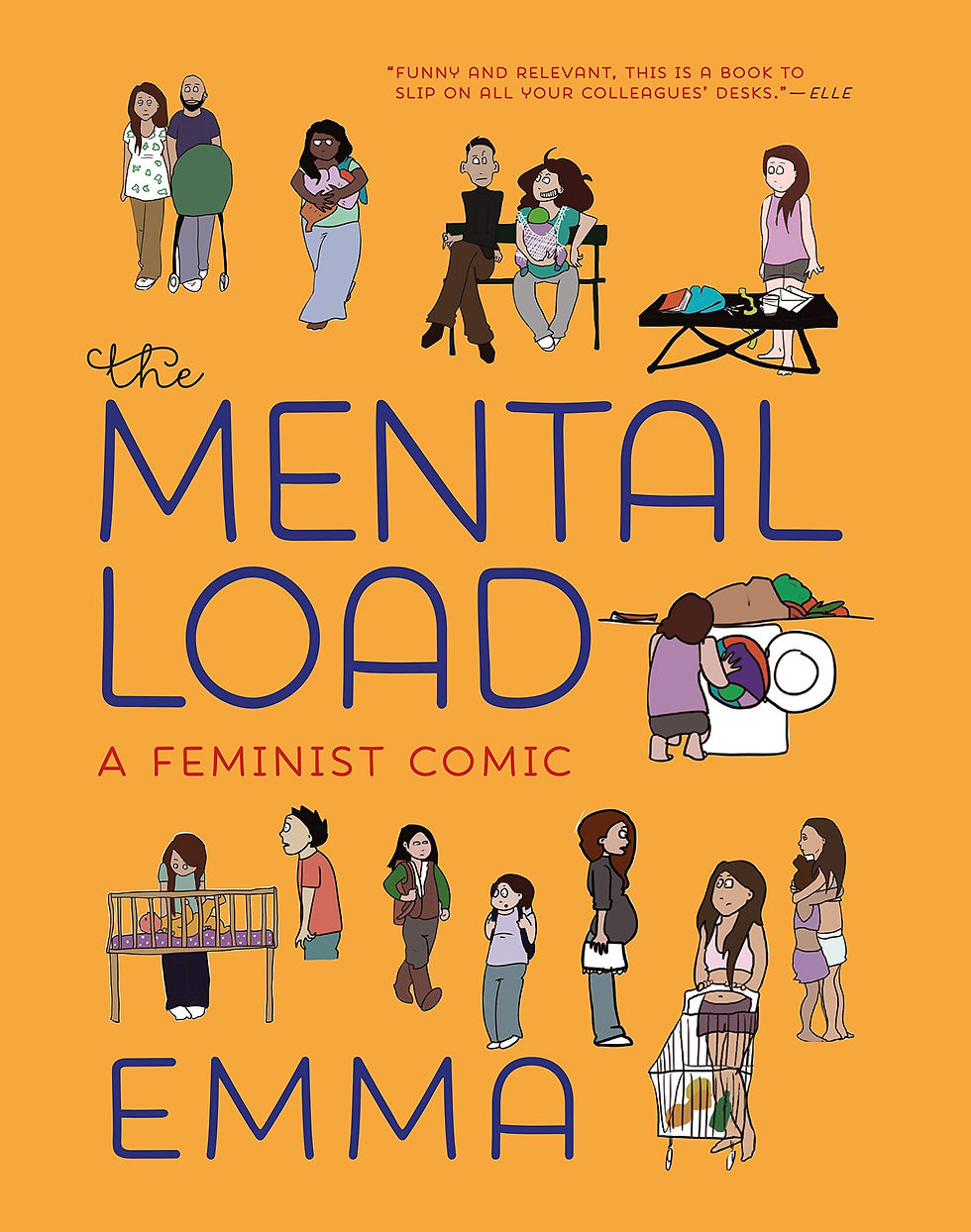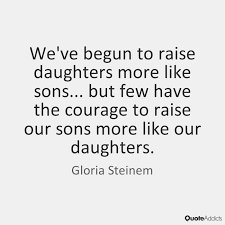Gloria Steinem and parent tips on that F word – feminism
- Leah Jewett

- Mar 8, 2022
- 12 min read
Updated: Mar 16, 2022

“When parts of our bodies go undescribed, we often feel they are wrong or forbidden. Outspoken Sex Ed is a step toward universality and acceptance – for ourselves and for each other”
– feminist icon Gloria Steinem speaks out about Outspoken
What does feminism have to do with sex education? A lot! Here we look back at the time dedicated feminist Emma Watson met “mother of feminism” Gloria Steinem, we namecheck some people who are feminist through their words and/or actions and we set out some ways you can think, talk and act along feminist lines at home

She embodies the word feminist, she’s the co-founder of Ms magazine and she’s one of the most significant political activists of our time – so it’s sensational to have an endorsement for Outspoken Sex Ed from the revolutionary Gloria Steinem.
A women’s liberation movement legend – and still going strong – Steinem came to attention in 1963 by going undercover to write the article “I Was A Playboy Bunny” and went on to write the seminal piece “After Black Power, Women’s Liberation”. Steinem help found influential organisations such as the National Women’s Political Caucus and the Women’s Media Center. In her memoir My Life On The Road, she describes campaigning cross-country for women’s rights, holding meetings in “gyms, libraries, shopping centers, bowling alleys, rock concerts, backyard barbecues, campus rallies, subway stops, union halls, immigration lines, movie theaters and bagel shops”. Among many awards, she was given the Presidential Medal of Freedom.

Back when I was a teenager in 1970s San Francisco, Ms was – along with Mad magazine and Psychology Today – pretty much the only magazine I read. A classic image of Steinem in her aviator glasses subtitled What Would Gloria Do? is emblazoned on my phone case, and I wear bracelets she designed that spell out “Imagine” and “We are linked not ranked”.
So I was over the moon to interview Gloria Steinem for a Guardian Q&A in 2016. In a black jumper pulled down over her hands, teenager-style, she was sinuously elegant, honest and full of conviction, with a great warm confident smile and a laugh, maple-syrup rich and smooth, that she often used as a stock-taking pause. I told her I was so happy to meet her, and she replied in her soft-spoken, measured way that she was happy to meet me too. It was almost hard to square how gracious, interested, relaxed and approachable she was in answering questions and asking some in return with knowing how formidably she has stood for equal rights and reproductive freedom, shifted political discourse, changed lives.
The next day, at London’s Emmanuel Centre, Steinem was interviewed by Emma Watson. Having taken a year off acting to focus on feminism, Watson had chosen My Life On The Road as the first title for her online book club Our Shared Shelf.

Billed as “life lessons from the jedis of feminism”, it was a historic moment: a 25-year-old British movie star – who as UN Women Goodwill Ambassador had launched the HeForShe initiative – meets an 85-year-old American trailblazer, one of the greatest feminist icons of the 20th and 21st centuries. Both were clear, candid, vulnerable (“I love crying,” Watson said) and strong (“I always say to audiences of men: cooperation beats domination – trust me,” laughed Steinem). When Watson asked if a Gloria mantra would be “Never, never, never, never give up”, Steinem replied: “Yes. And dance a little.”
Unsurprisingly, the nearly nonexistent media coverage focused on Watson’s eyebrows and her citing OMGyes.com, a site about sexual pleasure (later shockingly edited out of the video of the talk), which I wrote about in the HuffPost piece Emma Watson, Gloria Steinem And My 10-Year-Old Daughter. Afterwards it was amazing to see Steinem, signing books, smile across the table at my daughter Dare. Her inscription: “To Dare, who is our future!”


“Girls are taught to view their bodies as unending projects to work on, whereas boys from a young age are taught to view their bodies as tools to master their environment”
– Gloria Steinem
Steinem’s powerful observation really hits home: girls have their work cut out for them in measuring their self-worth against societal beauty ideals, while boys don’t spend comparable hours scrutinising themselves in the mirror. How much time, energy and money do girls and women lose in compartmentalising and perfecting their body?
That’s one thing I love about feminism: it’s about questioning our culture and unlearning the messages we internalise over time.


Once you realise how our world has been predominantly designed by men – think architecture, music, art, philosophy, politics, economics, clothing, transport, education, architecture and even furniture – it’s pretty impossible to stop being aware of how our values are prioritised and filtered through a white heterosexual male gaze.
Meanwhile feminism and sex education go hand in hand.
They both involve critical thinking around things like – are you ready?! – sex relationships power dynamics and imbalances gender stereotyping gender norms gender expectations unconscious bias equality masculinity mansplaining the male gaze sexism patriarchy objectification self-objectification inclusivity and awareness around LGBT+ identities tackling and preventing sexual harassment and violence against women and girls (VAWG) sexual health and wellbeing sexual decision-making sex positivity bodily autonomy body image self-esteem the media social media sexting/sending nudes the impact of porn on attitudes and behaviour self-respect respect and of course consent.
Sex education is a feminist issue.

“I was angry about the human talent that was lost just because it was born into a female body”
“In the words of so many daughters who don’t yet know that a female fate is not a personal fault, I told myself: I’m not going to be anything like my mother”
– Gloria Steinem
How can you talk with your girl – and equally importantly with your boy – about feminism?

First define feminism. Explain that feminism is a way of understanding how gender and gender relations “silently govern our daily lives” – and how society treats girls and women. We need to make sure they have the same opportunities as boys and men. Feminism is about advancing women’s rights and girl power because historically girls and women have had much less social, political and economic power than boys and men. We all benefit from what women fought for – the right to vote, to write under their name rather than a pseudonym or as “anonymous”, to go to university, to buy property, to have a credit card, to open a bank account. To this day, girls and women still face a fight for equality. Basically feminism is about fairness – if a girl and boy share biscuit, should she get less than half because she’s a girl? Feminism is about equality for all.
Here’s the most useful advice I’ve amassed on how to talk along feminist lines at home…

Mind your language If you tell your girl she’s beautiful, also praise her for being strong, smart, independent, bold, curious – and if you tell your boy he’s brave, add that he’s thoughtful, sweet, sensitive, beautiful, kind. Don’t default to “he” for toys or animals – test drive “they” instead, which is also LGBT+ inclusive if you don’t know someone’s sex. Reverse-engineer saying “boys and girls” to say “girls and boys”. Don’t default to assuming a doctor, engineer, pilot, mathematician, architect, astronaut or scientist is male

Call out the gender divide Gender awareness begins at around age 2 – and there’s a steady drip, drip effect across every aspect of children’s lives. Combat this early on by asking your child why there are “girl colours” and “boy toys” and why only girls or boys are “allowed” certain clothes/books/sports/dress codes/school subjects. Why are girls socialised to be people pleasers and boys considered weak if they cry or ask for help? Tell your child that gender doesn’t define them – they can make their own choices and be creative in their own ways

Smash gender stereotypes and ask a lot of questions Get your child in the habit of critical thinking. What’s a stereotype and what’s a fact? What’s a result of conditioning? Are girls innately chatty, helpful and well behaved? Are boys innately boisterous and better at science and maths? Acknowledge invisible and emotional labour: are more mums than dads making pack lunches, arranging playdates and picking kids up from school? What gender roles does your child see in books, on TV, at home? Why do you think it’s OK for a girl to play with a train or do ice hockey but not for a boy to play with a doll, cook, want to be a teacher or not enjoy team sports? Stereotypes shape who your child plays with and how – and influence their aspirations
Do a gender audit on your media Search up books, movies, TV shows, videos and social media accounts “that are not written by cisgender men, since their voices already dominate much of society”. So stock up on picture books, stories and graphic novels that include girls and women. You can’t be what you can’t see (or read, or discuss, or understand)

Unpack messaging around clothing Why are girls’ clothes often tight and impractical and boys’ clothes baggy and built for action? Who is more likely to wear a T-shirt with kittens, cupcakes, hearts, flowers, princesses, friends, sparkles and butterflies – and who gets lions, dinosaurs, football, skateboards, game consoles, sharks, tractors and skulls? In other words, who’s “cute but crazy” and who’s a “rule breaker, hero-in-training building the future”?
Model equality at home Lead by example. Share childcare. Role-reverse the retrograde “There’s boy jobs and girl jobs” division of labour flaunted by ex-prime minister Theresa May. Don’t be self-deprecating about your accomplishments or abilities
Raise awareness If an adult says something to your child that unhelpfully reinforces gender stereotypes, maybe reply with humour or give a counter example from your life. Then talk to the adult when your child isn’t there and/or discuss it later with your child. Trust your outrage

Discuss how the word feminism can make people uncomfortable Why is that though? Some people feel that “the F word” has “gone too far” or “done more harm than good”, often because they perceive it as a threat to men. But actually feminism makes everyone’s lives better

Make feminism relatable Capture your child’s attention via their interests – talk about how Ada Lovelace wrote the first computer programme or about the involvement, as shown in the film Hidden Figures, of female African-American mathematicians in the Nasa space programme. In celebrating female pioneers and icons you’ll normalise their existence
Empower girls to talk to other girls about issues like body image, gender equality, speaking up for themselves, being confident. Check out STEM (science technology engineering maths) or STEAM (which includes art and design) activities. Encourage your girl to embrace her wild side and break all of the glass ceilings in her way

Reflect on what shaped you Do you remember moments when you became aware of gender issues? Growing up, what stories did you hear about power, feminism, justice? What if you’d learned feminist ideas earlier? Who influenced your perspectives on feminism: parents, friends, media? Do your definitions of equality and feminism differ from your family’s? What role does power play in your relationships at work and at home? When did you first feel unsafe or experience harassment on the street or at school, work or home? How do power, privilege, culture and identity impact how and whether you encounter harassment? Who taught you to regulate your feelings? What impact have media and pop culture had on how you see yourself, the world, other people? (Thanks, This Book Is Feminist, for the inspiration)
Use news stories as a way in See our latest Talking Points for parents to use with their kids…
“Many trips… left me amazed by what is, angered by what isn’t and hooked on what could be”
– Gloria Steinem
We Should All Be Feminists, wrote Chimamanda Ngozi Adichie – and Beyoncé sampled her stirring lines in the song Flawless: “We tell girls to shrink themselves… We say to girls: You can have ambition but not too much… Why do we teach girls to aspire to marriage but we don’t teach boys the same?… We raise girls to be competitors… for the attention of men… We teach girls that they cannot be sexual beings in the way that boys are… Feminist: a person who believes in the social, political and economic equality of the sexes.”
Loud and proud: (clockwise from top left) Benedict Cumberbatch, Tinie Tempah and Ed Miliband for Elle magazine; Emma Watson reads the Vagina Monologues; Madonna, Beyoncé and Rihanna claim the word feminist; a 1911 National Federation of Women Workers march; Beyoncé in Flawless
When you stop to think about it, how many feminists can you actually name?
On the other hand, there might be many people you can name who have furthered feminism or taken a stand on advancing the rights and lives of girls and women. Notably…
activist TARANA BURKE launched the #MeToo movement • journalist CAITLIN MORAN wrote How To Build A Girl • suffragette EMMELINE PANKHURST helped white British women win the right to vote • scholar GERMAINE GREER wrote The Female Eunuch • philosopher MARY WOLLSTONECRAFT wrote A Vindication Of The Rights Of Woman • actor ASHTON KUTCHER talks about women and sexuality • ex-black panther ANGELA DAVIS championed civil rights • social theorist SIMONE DE BEAUVOIR wrote The Second Sex • poet AUDRE LORDE wrote about oppression • activist NATASHA WALTER wrote The New Feminism • journalist NAOMI WOLF wrote Vagina • professor BELL HOOKS wrote Feminism Is For Everybody • musician CHRIS MARTIN committed to ending gender inequality • campaigner AMIKA GEORGE founded Free Periods • novelist MARGARET ATWOOD wrote The Handmaid’s Tale • singer Billie Eilish broadcasts feminist messages • author CHIMAMANDA NGOZI ADICHIE wrote We Should All Be Feminists • activist SCARLETT CURTIS wrote Feminists Don’t Wear Pink And Other Lies • actor Reese Witherspoon founded Hello Sunshine • Supreme Court Justice RUTH BADER GINSBURG spoke up for the LGBT+ community • actor KEIRA KNIGHTLEY speaks frankly • activist JAMEELA JAMIL promotes women’s issues • historian REBECCA SOLNIT wrote Men Explain Things To Me • actors FOREST WHITAKER & KIEFER SUTHERLAND and musician HARRY STYLES supported HeForShe • activist MALALA YOUSAFZAI wrote I Am Malala • actor ALAN ALDA is a passionate feminist • writer CAROLINE CRIADO-PEREZ got Jane Austen onto a £5 bank note and the first statue of a woman – suffragist Millicent Fawcett – into Parliament Square • activist GINA MARTIN made upskirting illegal • poet SONYA RENÉE TAYLOR wrote The Body Is Not An Apology • actor DAVID SCHWIMMER started a sexual harassment campaign • comedian SANDI TOKSVIG co-founded the Women’s Equality Party • former slave SOJOURNER TRUTH fought for women’s rights • feminist HEATHER CORINNA founded Scarleteen • activist BETTY FRIEDAN wrote The Feminist Mystique • social reformer SUSAN B ANTHONY was a suffrage crusader • playwright V (formerly EVE ENSLER) wrote The Vagina Monologues • the group RIOT GRRRL tackled sexism • director JANE CAMPION made The Power Of The Dog • campaigner CLARE WILLETTS founded not only pink and blue • comedian DEBORAH FRANCES-WHITE hosts The Guilty Feminist • singer COURTNEY LOVE addresses body image • artist FLO PERRY wrote How To Have Feminist Sex • artist JUDY CHICAGO created The Dinner Party • writer ALICE WALKER advocates for black woman • diplomat ELEANOR ROOSEVELT promoted women’s political engagement • actor JON HAMM denounced gender-based violence • comedian SARA PASCOE wrote Sex Power Money • singer TINA TURNER spoke out about domestic abuse • working mum JUDY SYFERS wrote the essay Why I Want A Wife • comedian AMY POEHLER founded Smart Girls • activist ADRIENNE MAREE BROWN wrote Pleasure Activism • campaigner LAURA BATES founded Everyday Sexism • actor STEVE CARRELL wore HeForShe cufflinks • politician ED MILIBAND wore a This Is What A Feminist Looks Like T-shirt • activists EMMA & MAYA TUTTON founded Our Streets Now • scholar KIMBERLÉ CRENSHAW coined the term intersectionality • psychoanalyst JOYCE McFADDEN wrote Your Daughter’s Bedroom • actor ANTONIO BANDERAS spoke out against sexual violence • attorney MICHELLE OBAMA founded the Girls Opportunity Alliance • artist TRACEY EMIN created My Bed • comedian SARAH SILVERMAN calls out sexism • the SPICE GIRLS popularised girl power • actor LENA DUNHAM wrote Girls • actor BENEDICT CUMBERBATCH boycotts roles if female co-stars aren’t paid equally • actor ALAN ALDA is a passionate feminist • politician HILLARY CLINTON said: “Women’s rights are human rights” • mononym singer MADONNA labelled herself a “bad feminist” • actor SALMA HAYEK is a proud feminist • performer BEYONCÉ championed black feminism in Lemonade • UK ex-royal PRINCE HARRY declared: “I’m a feminist” • actor GEENA DAVIS founded the Institute on Gender In Media • artist FRIDA KAHLO made powerful self-portraits • campaigner LAURA CORYTON founded Stop Taxing Periods • actor ROBERT WEBB wrote How Not To Be A Boy • ROXANE GAY wrote Bad Feminist • author MAYA ANGELOU wrote the poem Still I Rise • the group BIKINI KILL were punk feminists • campaigner JESS DAY campaigns for Let Toys Be Toys • singer HARRY BELAFONTE co-chaired the Women’s March • performer JANELLE MONÁE celebrates gender equality • speaker CHRIS HEMMINGS wrote Be A Man • columnist JESSICA VALENTI wrote Full Frontal Feminism • comedian BRIDGET CHRISTIE combats patriarchy • artist CHANEL MILLER wrote Know My Name • student SOMA SARA started Everyone’s Invited • creative director JUDE KELLY founded WOW (Women of the World festival) • talk show host OPRAH WINFREY is a symbol of feminism • actor ANGELINA JOLIE speaks out on women’s rights • journalist PEGGY ORENSTEIN wrote Cinderella Ate My Daughter • psychotherapist SUSIE ORBACH wrote Fat Is A Feminist Issue • visionary modernist VIRGINIA WOOLF wrote A Room Of One’s Own
…among others.
We live in a world where even fonts come loaded with gender connotations. Sigh.
So let’s talk about feminist ideas with our kids. For us at Outspoken, having Gloria Steinem’s empathic take on how crucial it is to accept our bodies and ourselves adds more fuel to the personal and political fires of why talking openly at home about sex and relationships is important – for you and your child in the moment, and for them and for society in the future.

Read more about the phenomenal Gloria Steinem here and follow her on Twitter, Facebook and Instagram. See also Outspoken director Leah Jewett’s Guardian Q&A with Steinem, Do What You Love So Much You Forget What Time It Is, and her HuffPost write-up of what Steinem and the stellar Emma Watson had to say







































Comments